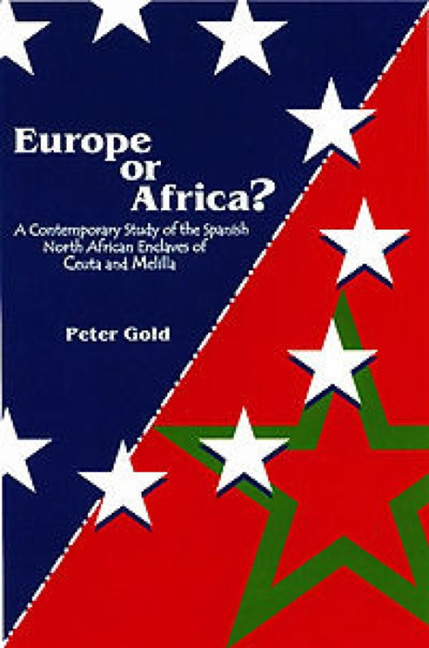Book contents
- Frontmatter
- Dedication
- Contents
- Acknowledgement
- List of figures and tables
- Map
- Introduction
- 1 The impact of the enclaves on Spanish–Moroccan relations
- 2 The enclaves within the Spanish state: the autonomy statutes
- 3 The evolving political landscape in the enclaves
- 4 The 1985 Immigration Law and community relations in the enclaves
- 5 The enclaves: a migration gateway to Europe
- 6 The enclaves: Europe or Africa?
- 7 Gibraltar and the enclaves
- 8 Conclusion: looking to the future
- References
- Index
8 - Conclusion: looking to the future
- Frontmatter
- Dedication
- Contents
- Acknowledgement
- List of figures and tables
- Map
- Introduction
- 1 The impact of the enclaves on Spanish–Moroccan relations
- 2 The enclaves within the Spanish state: the autonomy statutes
- 3 The evolving political landscape in the enclaves
- 4 The 1985 Immigration Law and community relations in the enclaves
- 5 The enclaves: a migration gateway to Europe
- 6 The enclaves: Europe or Africa?
- 7 Gibraltar and the enclaves
- 8 Conclusion: looking to the future
- References
- Index
Summary
Relations between Spain and Morocco
This study set out to explore the unique phenomenon of the Spanish North African enclaves from a variety of different perspectives. The first of these concerned the effect of the towns on relations between Spain and Morocco. There is no doubt that in many respects Spanish–Moroccan relations would be different if Ceuta and Melilla were merely towns in northern Morocco rather than territories disputed between the two nations, but there is equally no doubt that a change in the status of the enclaves is not a pressing concern for Morocco at the start of the twenty-first century. The two countries have established a modus vivendi which is based on a recognition that as neighbours they need to get on with each other in spite of their differences, and that for all sorts of reasons – aid, trade, plus (for Spain) investment and the Algerian gas pipeline – each is important to the other's economic prosperity. That said, there is no indication that Spain intends to make any concessions towards Morocco over Ceuta and Melilla, and by the same token there is no sign that Morocco intends to abandon its claim to the enclaves and other related territories (see the Introduction). The impasse is set to remain in place, and the issue will therefore continue to trouble Spanish–Moroccan relations for the foreseeable future.
However, having antagonized Morocco in recent years with measures such as the 1985 Immigration Law, the introduction of visas and the granting of autonomy statutes to the enclaves, Spain is anxious not to do anything further which would alienate its neighbour to the south. On the contrary, the recent introduction of a less stringent (some would say markedly liberal) Immigration Law (Chapter 4) and the bilateral agreement on a number of fixed-term work contracts (Chapter 5) will have been well received in Rabat. By the same token, it is highly unlikely that Morocco would undertake any aggressive action which might provoke Spain into a hostile response.
- Type
- Chapter
- Information
- Europe or Africa?A Contemporary Study of the Spanish North African Enclaves of Ceuta and Melilla, pp. 166 - 176Publisher: Liverpool University PressPrint publication year: 2000



